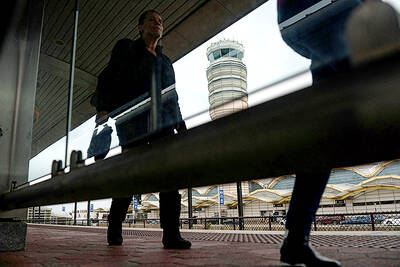The Middle East foreign policy black hole has relentlessly sucked in US diplomacy for more than a half century and now awaits US president-elect Barack Obama even as he refuses to show his hand before taking office.
While the Israeli assault on the Gaza Strip puts the perennial regional puzzle in stark relief for the incoming administration, it is just another in the long history of crises and bloody conflicts between the Jewish state and the Palestinians.
And there are signs that despite the fighting in Gaza, the Israel-Palestinian conflict may not — and should not — be the heart of US policy in the Middle East after Obama takes office next Tuesday.
Instead, analysts say, Obama may need to focus more on stemming the rise of Islamic extremism.
Conventional wisdom in the US has long held that an Israeli-Palestinian peace would trigger a seismic shift in the region. Leaders across the Middle East would lose their excuse for refusing to accept the Jewish state as a legitimate neighbor.
Thuggish Arab regimes could no longer use the conflict to rationalize their brutality and undemocratic behavior. Free elections would produce moderate, democratic rule.
That view, however, was seriously undercut with the rise to power of the militant Islamic group Hamas in Gaza, the impoverished Palestinian enclave separated by Israeli lands from main Palestinian territory in the West Bank. Washington labels Hamas as a terrorist organization.
Hamas’ rise to authority in Gaza put the tiny slice of misery — a humanitarian sore abutted by Israel on two sides and bounded to the west by Egypt and the Mediterranean Sea — in the orbit of Iran, a non-Arab country with an extremist Islamic leadership that vows the destruction of Israel.
Hamas’ rise also buoyed another US adversary, Syria, which has provided Hamas with funding and refuge for its leaders. Syria is an anomaly in the Arab world in that it is allied with the Iranians despite historic Arab-Persian animosity. Both Iran and Syria also offer essential support to Hezbollah, the Islamic movement that has accumulated power over large parts of Lebanon, on Israel’s north.
Israel fought Hezbollah to a stalemate in Lebanon in August 2006.
Deeply afraid of growing Iranian influence in the region and fearing Tehran may soon be a nuclear power, Arab countries like Egypt, Jordan and Saudi Arabia — nominal but difficult US allies — have been slow to add their voice and activities to the conflict in which the Israelis are pummeling Gaza with the aim of crippling Hamas.
The seeming ambivalence of such Arab states to act in face of the Israeli attacks, despite massive street protests in support of Hamas, has blunted a source of pressure on Israel to stop its deadly assault and signals a further evidence of wobbly Arab solidarity.

FRUSTRATIONS: One in seven youths in China and Indonesia are unemployed, and many in the region are stuck in low-productivity jobs, the World Bank said Young people across Asia are struggling to find good jobs, with many stuck in low-productivity work that the World Bank said could strain social stability as frustrations fuel a global wave of youth-led protests. The bank highlighted a persistent gap between younger and more experienced workers across several Asian economies in a regional economic update released yesterday, noting that one in seven young people in China and Indonesia are unemployed. The share of people now vulnerable to falling into poverty is now larger than the middle class in most countries, it said. “The employment rate is generally high, but the young struggle to

ENERGY SHIFT: A report by Ember suggests it is possible for the world to wean off polluting sources of power, such as coal and gas, even as demand for electricity surges Worldwide solar and wind power generation has outpaced electricity demand this year, and for the first time on record, renewable energies combined generated more power than coal, a new analysis said. Global solar generation grew by a record 31 percent in the first half of the year, while wind generation grew 7.7 percent, according to the report by the energy think tank Ember, which was released after midnight yesterday. Solar and wind generation combined grew by more than 400 terawatt hours, which was more than the increase in overall global demand during the same period, it said. The findings suggest it is

TICKING CLOCK: A path to a budget agreement was still possible, the president’s office said, as a debate on reversing an increase of the pension age carries on French President Emmanuel Macron yesterday was racing to find a new prime minister within a two-day deadline after the resignation of outgoing French Prime Minister Sebastien Lecornu tipped the country deeper into political crisis. The presidency late on Wednesday said that Macron would name a new prime minister within 48 hours, indicating that the appointment would come by this evening at the latest. Lecornu told French television in an interview that he expected a new prime minister to be named — rather than early legislative elections or Macron’s resignation — to resolve the crisis. The developments were the latest twists in three tumultuous

IN THE AIR: With no compromise on the budget in sight, more air traffic controllers are calling in sick, which has led to an estimated 13,000 flight delays, the FAA said Concerns over flight delays and missed paychecks due to the US government shutdown escalated on Wednesday, as senators rejected yet another bid to end the standoff. Democrats voted for a sixth time to block a Republican stopgap funding measure to reopen government departments, keeping much of the federal workforce home or working without pay. With the shutdown in its eighth day, lines at airports were expected to grow amid increased absenteeism among security and safety staff at some of the country’s busiest hubs. Air traffic controllers — seen as “essential” public servants — are kept at work during government shutdowns, but higher numbers